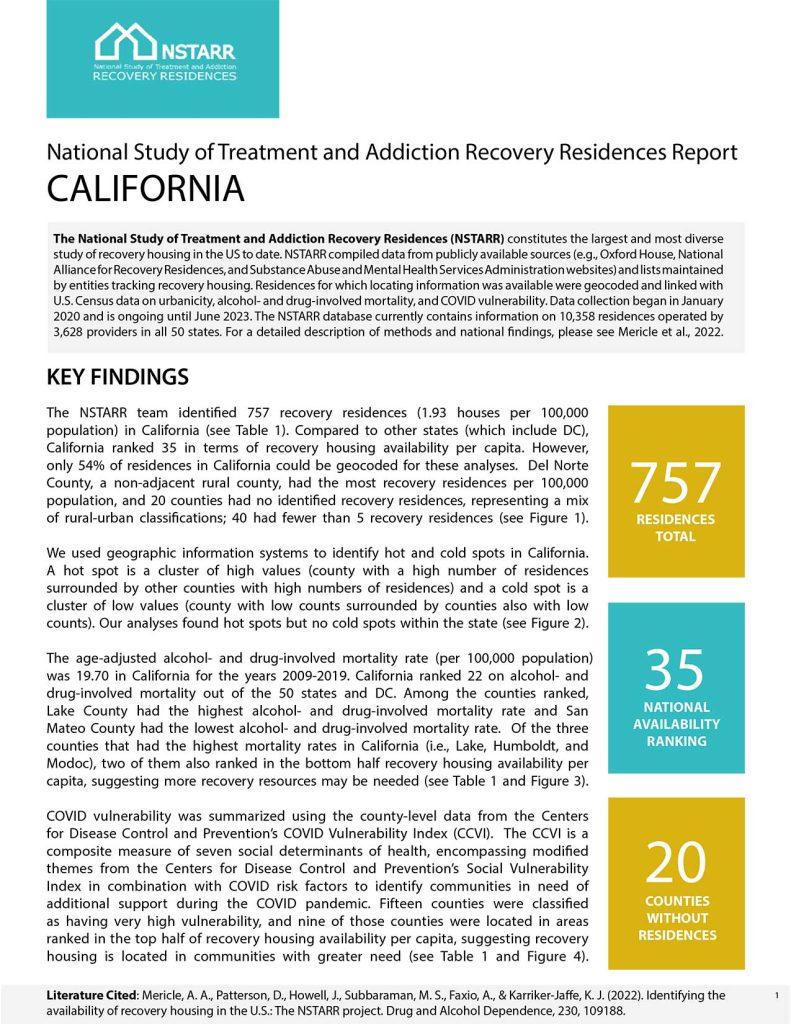The National Study of Treatment and Addiction Recovery Residences (NSTARR) project is the largest and most diverse study of recovery housing to date. Data from across the U.S. were gathered and analyzed to develop the first comprehensive database and assessment of the recovery residence landscape. As part of the assessment, the study team, led by Scientist and project PI Amy Mericle, created individual state-level reports which provide a snapshot of the number and location of recovery residences as it relates to population density, alcohol- and drug-involved mortality, and COVID vulnerability in the 50 states and Washington, D.C. Residences for which locating information was available were geocoded and linked with U.S. Census and other data to contextualize characteristics of where recovery residences are located. These reports are based on data collected between January 2020 and January 2021, representing 10,358 distinct recovery residences belonging to 3,628 different recovery housing providers.
Project Impacts
State Reports

NSTARR Report for California
The NSTARR project and its reports provide national and county-level assessments of the current recovery housing landscape for each state, enabling local providers, advocacy groups, and other stakeholders to better understand service need and gaps in service provision. Residences, for which locating information was available, were geocoded and linked with U.S. Census data on urbanicity, alcohol- and drug-involved mortality, and COVID vulnerability, providing a visual snapshot of need and ability to support that need within the current supply of residences. Such analysis lends a valuable tool for states to determine priority areas for recovery residences. COVID vulnerability was also mapped using the county-level data from the Centers for Disease Control and Prevention’s COVID Vulnerability Index (CCVI). The CCVI is a composite measure of seven social determinants of health, encompassing modified themes from the Centers for Disease Control and Prevention’s Social Vulnerability Index in combination with COVID risk factors to identify communities requiring additional support brought on by the pandemic. The reports are available to view and download.
Database
The NSTARR database contains information on 10,358 residences operated by 3,628 providers in all 50 states plus Washington, D.C. Residences were more likely to be in urban settings and in counties with higher substance use mortality and a significant lack of housing in economically disadvantaged areas. Recovery housing density also was greater in urban areas and areas with a greater proportion of non-White residents, but lower in economically disadvantaged areas. While there is a wealth of research on recovery housing, critical gaps remain. The NSTARR Project is an important first step to expand our understanding and knowledge of recovery housing across the country.
Project Partners
Work on the NSTARR project is guided by 17 Study Experts who represent diverse recovery housing stakeholders. These Study Experts consist of recovery, housing, and recovery housing researchers as well as providers and leaders of national recovery housing organizations. Stakeholders helped to refine study procedures and ensure that our work was relevant to those who would be potential consumers of it.
Funding
This project is funded by the National Institute on Alcohol Abuse and Alcoholism at the National Institutes of Health under award #R01AA027782 (Mericle).
The research team would also like to acknowledge the recovery residence operators who make information about their recovery residences publicly available or otherwise contributed to the NSTARR database.
Related Articles & Information
Amy Mericle Talks About the Importance of the NSTARR Project (video)





